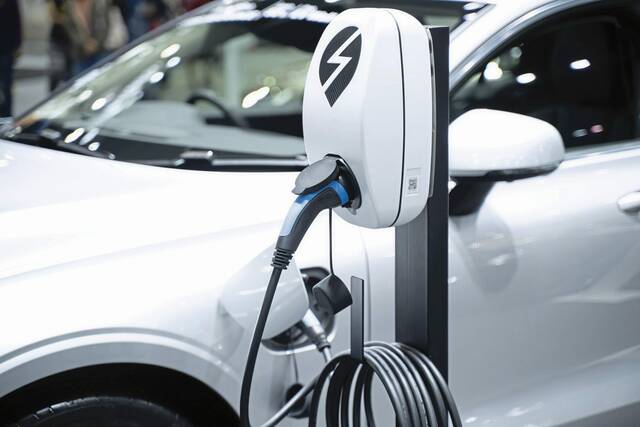https://triblive.com/local/pittsburgh-to-incorporate-electric-vehicle-charging-into-city-renovation-construction-projects/
Pittsburgh to incorporate electric vehicle charging into city renovation, construction projects

An ordinance adopted Tuesday by Pittsburgh City Council will require the city to incorporate electric vehicle charging plans into its renovation and construction projects.
Under the Electric Vehicle Readiness Ordinance, new and renovated city-owned facilities will be required to have the electrical capacity and equipment installed to support the city’s fleet of electric vehicles and to encourage the public to charge their electric vehicles at the facilities.
Mayor Bill Peduto touted the measure as a way to improve air quality and reduce emissions.
“One way to ensure more people feel comfortable purchasing electric vehicles is to make it easy for them,” Councilwoman Erika Strassburger said.
The measure calls for a task force to decide on installing DC Fast Charging stations to meet the city’s needs and to ensure upgrades to any city facilities incorporate infrastructure that would accommodate electric vehicle chargers.
A strategic plan adopted last year calls for the city to add more than 200 new public charging plugs on city property — as well as more than 2,000 total across the city — by 2025.
Today there are more than 280 publicly listed charging stations at 75 locations in the city, according to data from November 2020. Most public chargers allow drivers to charge at no cost, the data show, while those that do charge do so either by the hour or kilowatt-hour.
There are 35 public charging stations at four Pittsburgh Parking Authority garages — the Fifth Avenue Garage, Grant Street Transportation Center, Third Avenue Garage and Smithfield Liberty Garage — as well as the Second Avenue Plaza Lot. All of those are free.
City officials have not yet adopted a cost structure moving forward, spokeswoman Molly Onufer said, but one recommendation outlined by city officials last year suggested a charge of $2 per hour.
Pittsburgh operates the largest fleet of electric vehicles in Western Pennsylvania, with 26. The city plans to add 36 more and to convert pickups, vans and refuse trucks to electric beginning next year.
The city has said it aims to operate a fossil fuel-free fleet of vehicles by 2030.
Copyright ©2026— Trib Total Media, LLC (TribLIVE.com)
